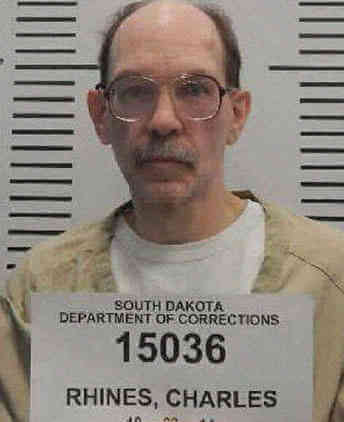The Supreme Court may soon determine whether to take up the case of an out gay man whose lawyers say was sentenced to death by jurors who were biased against him due to his sexual orientation.
In 1993, jurors deliberated the fate of defendant Charles Rhines, who murdered Donnivan Schaeffer while he was robbing a donut store in Rapid City, South Dakota, one year earlier. But testimony from those jurors, recorded by Rhines’ attorneys more than two decades later and revealed in a petition to the US Eighth Circuit Court of Appeals, give credence to the possibility that Rhines is on death row because he is openly gay.
The Supreme Court declined to consider arguments in Rhines’ case last year, but he and his legal team are now hopeful that his appeal will be heard.
“The new juror statements, combined with the change of law in Peña-Rodriguez, should provide Mr. Rhines the opportunity to show that there was juror bias that was not revealed in voir dire [jury selection], and that he was sentenced to death, in part, because he is a homosexual,” argued Rhines’ legal team, which includes public defender Neil Fulton as well as assistant public defenders with the Federal Community Defender Office in Philadelphia. The petition argued that the evidence of biased jurors should trigger a new trial.
Multiple jurors acknowledged in interviews with Rhines’ team that his sexual orientation was discussed during deliberations — and many recalled anti-LGBTQ attitudes — but none actually admitted that their own words were biased.
An investigator with the South Dakota Department of Criminal Investigation who also contacted jurors, however, has stated that jurors “uniformly reported that Rhines’ sexual orientation had no influence on their decision to impose a death sentence. Rather, the jurors reported that it was the brutality of the killing and Rhines’ remorseless confession that caused them to believe a death sentence was warranted.”
The statements from jurors reported by Rhines’ team, however, raise serious doubts about that conclusion. One juror, Harry Keeney, reflected back on the case in a note that indicates sexual orientation was a factor when the jurors opted to send him to death row.
“We thought that the crime was intentional,” he told Rhines’ legal team. “We also knew that he was a homosexual and thought that he shouldn’t be able to spend his life with men in prison.”
Another juror, Frances Cersosimo, said he heard a juror say, “If he’s gay, we’d be sending him where he wants to go if we voted for LWOP,” referring to life without parole.
Juror Bennett Blake told Rhines’ team that “lots of discussion” about homosexuality took place and “there was a lot of disgust. This is a farming community… There were lots of folks who were like, ‘Ew, I can’t believe that.’”
Jurors also passed along written notes to the judge asking a series of questions to clarify the definition of “life without parole.” Among the questions asked by jurors included whether or not Rhines would be allowed to mix with general inmate population, “marry or have conjugal visits,” or “create a group of followers or admirers.”
A 2017 ruling from the Supreme Court in a separate case gives Rhines hope and has emerged as a main reference point in his argument for a new trial. Despite Supreme Court precedent that jury deliberations should remain confidential, the court deviated from that norm in Peña-Rodriguez v. Colorado. In a 5-3 vote, the court ruled to make an exception from the confidentiality rule because that case was tainted by a juror’s reliance on racial stereotypes. That exception was aligned with the Sixth Amendment’s guarantee that defendants have a right to an “impartial jury” during trial.
The question of how to broadly to apply that exception was raised when Supreme Court justices ruled. Chief Justice John G. Roberts, Jr., one of the dissenters, asked whether sexual orientation bias counts as “sufficiently odious” to qualify for the Peña-Rodriguez exception, according to The New York Times. And South Dakota Attorney General Jason Ravnsborg, in his response to the petition submitted by Rhines’ lawyers, dismissed the recent statements from jurors as “not clear and explicit expressions of animus towards homosexuals,” instead classifying them under the category of an “offhand comment.”
Arguing that sexual orientation was not a factor in the jurors’ deliberations, Ravnsborg repeatedly turned to Peña-Rodriguez v. Colorado to point out how, in his mind, the cases shouldn’t be compared.
“Sexual orientation is not immutable to the same extent as race or gender,” he wrote. “A black or Mexican defendant’s race is immutable to the eyes of a jury while Rhines could have tried his defense without the jury knowing of his homosexuality.”
Ravnsborg continued to minimize the significance of Rhines’ identity as a gay man, saying that no “civil war has been fought over” sexual orientation and that there has never been a nationwide program perpetrated for the “extreme persecution of homosexuals.”
“Homosexuals have not served as scapegoats for pressing socio-economic problems with consequences felt by the population at large — such as loss of jobs or rising incidents of street crime,” he argued.
As if that weren’t enough, Ravnsborg said no politician “has ever proposed constructing a wall to keep homosexuals out of the country” and that “the acceptance of equality in regard to non-racial distinctions has occurred largely peaceably and with comparatively greatly less conflict.”
The high court is slated to consider Rhines’ petition for next week.
































